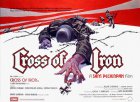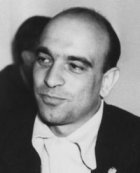
Cross of Iron Page #3
- R
- Year:
- 1977
- 119 min
- 1,012 Views
soon.
STRANSKY:
What about your platoon -- any
casualties?
STEINER:
Two killed. One missing.
STRANSKY:
Two killed. How?
STEINER:
(dryly)
Bullets.
STRANSKY:
(flushing angrily)
I deduced that. That missing man --
did you look for him, Steiner?
STEINER:
(shrugs impatiently)
We had no time to lose. It would
have been irresponsible to risk the
safety of the entire platoon for
the sake of one man.
STRANSKY:
There ought not to be a missing man
in Such a case.
STEINER:
(no expression)
Sorry, sir. I'll try to do better
next time.
STRANSKY:
(grimly; after a
moment)
I have the feeling, Sergeant, that
you somewhat overestimate your
importance.
STEINER:
(eyes darken; but no
change in voice)
At the moment, I am free of any
such illusions.
The two men look at each other; then Stransky's eyes fall
on the tommy gun Steiner holds in his hand.
STRANSKY:
That's not a German gun.
STEINER:
No, sir It's all in the report.
We surprised a Russian platoon --
and when they ran, they left
their guns.
STRANSKY:
Oh, captured material. Good.
Where is your gun?
STEINER:
We couldn't carry both, so we left
ours.
STRANSKY:
What! You left your guns for the
Russians!
STEINER:
(quietly)
Yes, sir. Our guns for the Russians.
STRANSKY:
That I cannot understand. You
must be aware that the quality of
our arms is far superior to that
of the Russians and --
He stops as Steiner shakes his head. Stransky raises his
eyebrows.
STRANSKY:
I beg your pardon?
STEINER:
...the Russian guns are better!
STRANSKY:
(sharply)
That is stupid, loose talk. You
have every reason to be grateful
for the fine equipment the Father
land puts into your hands at the
cost of countless sacrifices.
STEINER:
(cannot suppress a
mirthless grin)
I never asked then to put the stuff
in my hands,
Meyer looks toward heaven. Stransky takes a deep breath.
MEYER:
(hastily)
sir, Sergeant Steiner is greatly
in need of sleep. I'm positive
that When he --
Stransky cuts him short by turning his back in a gesture of
dismissal. Meyer motions for Steiner to follow him.
jump to their feet as they see Steiner and Meyer.
MEYER:
Be careful
he's taken strong dislike
to you.
STEINER:
(wryly)
Too bad. I'm crazy about him.
MEYER:
He can be trouble...
STEINER:
(laconically)
I've survived many a battalion
commander. I'll survive Stransky,
too.
16. INT. BUNKER STRANSKY AND TRIEBIG
at his desk, coffee cup in hand, sipping.
STRANSKY:
Dammit. This coffee is cold.
TRIEBIG:
Sorry, sir. It was heated not too
long ago
There is a LOUD EXPLOSION as a shell lands nearby.
The near miss has shaken up the bunker. Lieutenant Triebig
is righting a table that has overturned. Captain Stransky,
girm faced, is dusting off his uniform.
TRIEBIG:
(placing some papers
on the table; feeble
smile)
Too close for comfort, I should say,
Captain.
STRANSKY:
How many more papers are there for
me to sign?
TRIEBIG:
Quite a few, I'm afraid.
STRANSKY:
(sitting down; crossly)
Let me have the junk.
As he glances through the papers and signs his name. Triebig
watches him with his soft eyes, the smile remaining fixed
on his face. As Stransky finishes signing he looks up,
sniffs the air, looks at Triebig rather strangely.
STRANSKY:
That isn't perfume I smell -- is it?
TRIEBIG:
Oh, no, Captain --
(apologetically)
Just a bit of after shave lotion.
It -- bucks me up.
STRANSKY:
I see.
He fixes his gaze upon Triebig whose smile fades under the
scrutiny. Then, Stransky's manner changes suddenly. He
gestures toward a chair, tries to inject a cordial note
into his voice.
STRANSKY:
(offering him a
cigarette)
Where were you stationed before
you joined the battalion?
TRIEBIG:
(voice softening)
In the south of France -- Bordeaux.
STRANSKY:
Ah! Then being transferred must
have come hare, eh?
(voice casual)
Why were you transferred anyway?
TRIEBIG:
(after a moment's
Silence)
I voluntarily applied for a transfer,
sir.
STRANSKY:
(suspiciously)
How interesting.
There is mounting apprehension in Triebig's face as Stransky
regards him fixedly. Then again there is a sudden change in
Stransky's expression. Again it becomes friendly -- to Triebig's
great relief.
TRIEBIG:
We lived in real mansions right On
the beach. Swimming at any hour,
day or night. It was indescribable
-- the sea, the palms, the beaches,
the people, everything --
Overwhelmed by his memories, he stops. Stransky is surprised
to see him swallow with emotion.
STRANSKY:
(a knowing smile;
winks)
The women, you mean.
TRIEBIG:
(raising his head�j
I beg your pardon?
STRANSKY:
I said, the women. I mean -- in
referring to the people -- you meant,
of course, the women?
TRIEBIG:
(shrugging)
Not so much that. I am -- that is--
(suddenly confused)
I didn't have much time to think
about women.
Pause.
STRANSKY:
(casually)
Do you like soldiering?
TRIEBIG:
(emphatically)
Certainly.
STRANSKY:
(nods patronizingly)
I'm glad to hear that.
TRIEBIG:
It's like living in an altogether
different world.
The Candle hag burned down. Stransky rises to light another.
STRANSKY:
It is indeed a very different
world. A world of danger and a
world of men, a world without women.
(laughs; puffs, gets
thoughtful)
men can get along without
women. I tell you, man's truly
natural destiny is not to breed
children, but to be free, to rule
and fight -- in other words, to
lead a man's existence....
women are no more than a fancy,
a superfluous dessert.
(blows a smoke ring;
looks at Triebig)
Or do you disagree?
Triebig looks at Stransky in some confusion. What is Stransky
getting at. Then he gets a grip on himself. Intertwining
his fingers, he regards his thumb thoughtfully.
TRIEBIG:
I don't think I disagree, sir.
(after some
hesitation)
I think that if I have to I Can
live without women.
STRANSKY:
I'm pleased to hear that.
He studies the burning tip of his cigarette; then looks up
quickly.
STRANSKY:
In other words, you prefer the company
of a man to that of a woman?
TRIEBIG:
(greatly troubled
now)
It depends on the situation.
STRANSKY:
Really?
Stransky smiles. Triebig does not reply.
STRANSKY:
If it will help you, I will put
your thoughts into words for you.
(smilebroadens)
You prefer the society of men to
that of women in any and all
situations.
The words hang in the silence of the bunker. Triebig re-
treats into himself like a snail sealing itself up in its
shell. He stares with mingled fear, assent and hope at
Stransky's face which still registers nothing but friendly
assent. Then, afraid silence might be interpreted as
agreement, he murmurs...
TRIEBIG:
I -- don't understand, sir --
STRANSKY:
(smiles confidentially)
Let's drop the hide and seek. By
God, Triebig, you don't have to
put up a front with me of all
people. What I said is true,
isn't it? Say yes, man, for heaven's
sake.
TRIEBIG:
(with the air of a
man wanting to stop
himself; in a bare
whisper)
Translation
Translate and read this script in other languages:
Select another language:
- - Select -
- 简体中文 (Chinese - Simplified)
- 繁體中文 (Chinese - Traditional)
- Español (Spanish)
- Esperanto (Esperanto)
- 日本語 (Japanese)
- Português (Portuguese)
- Deutsch (German)
- العربية (Arabic)
- Français (French)
- Русский (Russian)
- ಕನ್ನಡ (Kannada)
- 한국어 (Korean)
- עברית (Hebrew)
- Gaeilge (Irish)
- Українська (Ukrainian)
- اردو (Urdu)
- Magyar (Hungarian)
- मानक हिन्दी (Hindi)
- Indonesia (Indonesian)
- Italiano (Italian)
- தமிழ் (Tamil)
- Türkçe (Turkish)
- తెలుగు (Telugu)
- ภาษาไทย (Thai)
- Tiếng Việt (Vietnamese)
- Čeština (Czech)
- Polski (Polish)
- Bahasa Indonesia (Indonesian)
- Românește (Romanian)
- Nederlands (Dutch)
- Ελληνικά (Greek)
- Latinum (Latin)
- Svenska (Swedish)
- Dansk (Danish)
- Suomi (Finnish)
- فارسی (Persian)
- ייִדיש (Yiddish)
- հայերեն (Armenian)
- Norsk (Norwegian)
- English (English)
Citation
Use the citation below to add this screenplay to your bibliography:
Style:MLAChicagoAPA
"Cross of Iron" Scripts.com. STANDS4 LLC, 2025. Web. 20 Jan. 2025. <https://www.scripts.com/script/cross_of_iron_839>.



Discuss this script with the community:
Report Comment
We're doing our best to make sure our content is useful, accurate and safe.
If by any chance you spot an inappropriate comment while navigating through our website please use this form to let us know, and we'll take care of it shortly.
Attachment
You need to be logged in to favorite.
Log In